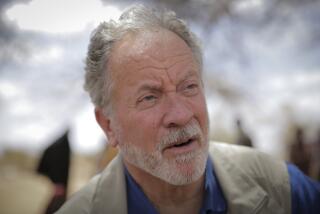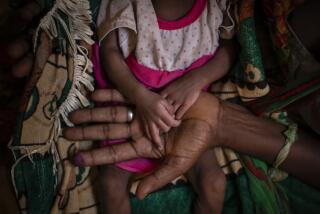Women Are the Key to Ending Hunger
- Share via
The United Nations estimates that women produce 80% of the food consumed in Africa, 65% in Asia and 45% in Latin America. They shoulder most of the domestic food processing and marketing tasks while also tending the home fires and caring for the young, the sick and the old. One could reflect on this traditional “division” of labor, but the real scandal is that women hold the key to ending hunger in the world’s poorest communities, yet in most developing countries, they still sow, water, weed, harvest and process their food crops by hand and their share of land resources and mechanized farm implements remains negligible.
By failing to support the local food production entrusted to women in the developing world, policymakers have unwittingly reinforced the dependency of marginal communities and many poor nations on food aid.
When a nation’s social inequalities interact with biases in national labor markets, credit institutions and legal systems, the consequences can be catastrophic. More than 200 million of the world’s children are malnourished, and inadequate diets are implicated in more than 12 million child deaths a year in poor countries. Equal opportunities and resources in the hands of women could reduce this toll.
It is a violation of women’s human rights that millions of young girls are kept at home or pulled out of school early to help prepare food, carry water and gather fuel while their brothers continue in school. Thus begins a vicious cycle that stifles girls’ capacity to do more in life and impacts on the nutrition and wellbeing of their children and their children’s children.
International conferences supported by U.N. organizations over the past two decades have helped to sensitize policymakers to the cost of gender discrimination.
Twenty years ago, women in developing countries were mostly learning to network and find their voices locally. They formed cooperatives and discussed common problems such as access to labor-saving technologies, safe water supplies and education for their children. Today, they are also working for economic and political empowerment.
Examples abound in my region, Africa. In Kenya, Wangari Maathai realized that deforestation was forcing women and girls to spend hours every day searching for wood for cooking fuel. She founded the Greenbelt Movement to regenerate and harvest woodlands. The movement has spread to 12 other African countries.
Today, these same forums are turning their attention to land use planning and policy advocacy.
In Zimbabwe, the United Nations Development Program supports a project to map “power points” in the society. It provides a “how to” on organizing political campaigns for seats on school boards, local councils and in national parliaments to influence decision-making and policies to be more sensitive to women’s needs.
Meanwhile, women in these countries must deal with the regional conflicts that are taking a terrible toll. Most of the wars of the past 50 years have been fought in the developing world, which is least able to afford them. Communities engulfed by conflict have little time to farm. Many villagers become refugees, abandoning their land. Nations at war become dependent on food imports and foreign aid. Soldiers sow land mines that maim those who attempt to till the soil long after peace treaties are signed.
With the U.N. Development Program’s support, women in Rwanda, Somalia, Sudan, the Philippines and Guatemala are setting aside ethnic allegiances. As the road to democracy opens up, women in my region are entering political spaces from where they can make lasting changes in leadership. This is the case in Ghana, Mali, Uganda, Kenya and South Africa. In war-torn countries, women are joining ranks across party lines, demanding that warring factions break the cycles of violence.
In most respects, the challenges of the new millennium will be the same as those today; frontiers of time are more yielding than the frontiers of gender inequality. But the dynamic leadership surfacing among women in Africa, Asia and Latin America has gained the attention of international development agencies which now recognize that women are the key to overcoming poverty and hunger. Some 50% of the U.N. Development Program’s expenditures are on projects that have a direct impact on poverty by supporting gender equality, better management of natural resources and more democratic governance.
The way ahead is no longer a mystery, though challenges remain to increase literacy and to give the poor, especially women, financial credit and other resources to push ahead. New data gathered over the past two decades have also yielded the hard evidence needed to convince policymakers that investments in women’s empowerment yield striking improvements in nutrition, shelter, health care and schooling for all. Armed with resources, knowledge and equal opportunities, women could erase most of the world’s hunger in our lifetime.
More to Read
Sign up for Essential California
The most important California stories and recommendations in your inbox every morning.
You may occasionally receive promotional content from the Los Angeles Times.













